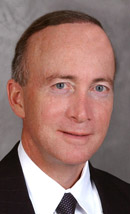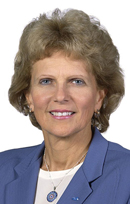
August 8, 2006
Indiana governor, Ford VP join national leaders at energy summit
WEST LAFAYETTE, Ind. — Indiana's governor and Ford Motor Co.'s vice president of environment and safety engineering will join other national leaders as part of an energy summit convened by U.S. Sen. Richard G. Lugar and Purdue University to discuss national energy issues.Gov. Mitch Daniels' remarks will open the Richard G. Lugar-Purdue Summit on Energy Security on Aug. 29. Ford Vice President Sue Cischke will speak as part of a panel discussion on "Implementing Strategies to Reduce Foreign Oil Dependence."
Other panelists are: Carol Battershell, vice president for alternative energy for BP Inc., and Amy Myers Jaffe, Wallace S. Wilson Fellow in Energy Studies at the James A. Baker III Institute for Public Policy of Rice University. Brian Lamb, president and CEO of C-SPAN, will serve as the panel moderator. Hudson is coming in place of Robert A. Malone, BP America Inc. chairman and president. The invitation-only summit will take place on Purdue's West Lafayette, Ind., campus.
Lugar and Purdue President Martin C. Jischke will have major speaking roles at the summit, and U.S. Rep. Pete Visclosky, D-Ind., the ranking Democrat on the House Energy and Water Appropriations Subcommittee, will be the luncheon speaker.
"The interest from government, industry and academic leaders in the upcoming energy summit is a clear indication that America is ready to develop a strategic plan to move toward alternative energies," said Lugar, R-Ind., who is chairman of the Senate Foreign Relations Committee. "This summit will help lay the groundwork for future public and private polices and address the national security issues with regard to energy dependence on foreign oil."
Jischke, who was recently named to the President's Council of Advisors on Science and Technology, said energy is a principal area of research at Purdue.
"Researchers at Purdue are leaders in the development of alternative fuels," Jischke said. "There is an interdisciplinary approach at Purdue to work in the field of energy research, including biofuels and clean-coal technology, as well as other alternative energy sources, including nuclear, hydrogen, wind and solar. Energy policy also is a strong area of study at Purdue."

|
Before becoming governor, Daniels was president of Eli Lilly and Co.'s North American Operations and CEO of the Hudson Institute, a public-policy think-tank now based in Washington, D.C. He has a law degree from Georgetown University and completed his bachelor's degree at Princeton University's Woodrow Wilson School of Public and International Affairs.

|
She earned a bachelor's degree in engineering from Oakland University in Rochester, Mich., and holds master's degrees in mechanical engineering and management from the University of Michigan-Dearborn.

|
The energy summit program chair is Wallace Tyner, Purdue professor of agricultural economics. Tyner does research in energy economics, and his past work has encompassed oil, natural gas, coal, oil shale, biomass, ethanol from agricultural sources and solar energy. Tyner also has worked on agricultural trade and policy issues with developing countries in the Middle East and North and West Africa. He has extensive overseas experience in Asia, Africa, the Middle East, Central and Eastern Europe, India, and Morocco.
Writer: Cynthia Sequin, (765) 494-4192, csequin@purdue.edu
Source: Wallace Tyner, (765) 494-0199, wtyner@purdue.edu
Purdue News Service: (765) 494-2096; purduenews@purdue.edu
Note to Journalists: Journalists may receive news credentials to cover the summit by contacting Cynthia Sequin, Purdue News Service, at (765) 494-4192, csequin@purdue.edu
Related Web site:
Richard G. Lugar-Purdue University Summit on Energy Security
To the News Service home page